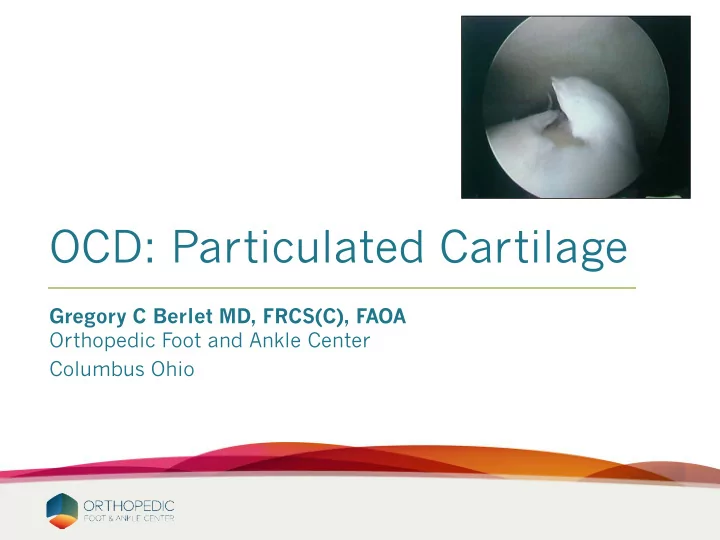

OCD: Particulated Cartilage Gregory C Berlet MD, FRCS(C), FAOA Orthopedic Foot and Ankle Center Columbus Ohio
Disclosures • Consultant/Speaker Bureau/Royalties/ Stock: Wright Medical, Stryker, ZimmerBiomet, DJO, Plasmology 4 , Amniox Medical, United Orthopedic Group, Paragon 28, CrossRoads, Ossio
They call it medical practice for a reason …. 1 year post microfracture of 1 x 1.5 cm OCD
Scope, Drilling OCD Talus • 1.0 X 1.2 cm OCD • contained 10 x 15 mm lesion
One Year Later With our Patient … Disappointment • Pain initially was better but now has come back • Swelling • Does not feel ‘right’ • Complication: Failure to achieve long term clinical success for our patient
Why did it fail ? • Size of the lesion - maybe • Access to lesion – Don’t think so • Bone support – Don’t think so but … • Limitation of microfracture
I Believe That …. Quality of Repair Matters: Quality of the cartilage repair is at least part of the reason that size matters I focus on critical size defects for my advanced cartilage restoration Lesions between 1.0 – 2.0: • Particulated cartilage grafting
Juvenile Cartilaginous Allograft Tissue • Particulated cartilage with viable cells • Secured into chondral defects with fibrin Juvenile Donor Joint
Treatment of osteochondral lesions in the ankle with a particulated juvenile cartilage allograft: mid-term outcomes in a challenging clinical population J.C. Coetzee 1 , E. Giza 2 , L. Schon 3 , G. Berlet 4 , S. Neufeld 5 , P . Reischling 6 , and E. Wilson 6 1 Minnesota Orthopedic Sports Medicine Institute, 2 Univeristy of California Davis, 3 Union Memorial Hospital, 4 Orthopedic Foot & Ankle Center, 5 Orthopaedic Foot & Ankle Center of Washington, 6 Zimmer Orthobiologics Coetzee et al FAI 34(9), 2013
DeNovo NT Graft Talus Study Purpose : Hypothesis: • DeNovo NT Graft • Evaluate mid- term outcomes provides good of DeNovo NT clinical Graft for the outcomes in a treatment challenging cartilage lesions patient in the talus population Coetzee et al FAI 34(9), 2013
Study Design • Retrospective • 5 study centers and prospective • 24 patients – All cases of • FAAM, AOFAS, ankle DeNovo VAS Pain NT Graft (100mm), SF- included 12, Pt • Single-arm, Satisfaction multi-center Coetzee et al FAI 34(9), 2013
24 Patients ; >50% Revision Surgery Age (years) 35 (range, 17.5 to 69) BMI (kg/m 2 ) 27.7 ± 5.8 (range, 19 to 45) Time from 6.85 ± 11 (range, 0.53 to Injury/Symptom Onset to 40) Surgery (years) Previous Surgery 10 (42%) None 14 (58%) ≥ 1 Surgical Procedure Open 12 (50%) Arthroscopic 3 (12.5%) Extended Portal 9 (37.5%) Coetzee et al FAI 34(9), 2013
Large Lesions Containment Full 6 (27%) 75 to 99% 11 (50%) 50 to 74% 5 (23%) Bone Removal None 4 (17%) Osteotomy 12 (50%) Plafondplasty 8 (33%) 125 ± 75 (range, 50 to Lesion Size (mm 2 ) 300) Lesion Depth (mm) 7 ± 5 (range, 3 to 20) Coetzee et al FAI 34(9), 2013
Results at ≥ 12 months Average Outcome Scores @ Final F/U 78% of ankles demonstrating good to excellent scores ( AOFAS ≥ 80) Coetzee et al FAI 34(9), 2013
Results at ≥ 12 months Re-Operation Reason # Re-Operations Removal of symptomatic or 5 failed osteotomy hardware Anterior Impingement 1 Partial Graft Delamination 1 (full revision) (~ 25% of graft) Coetzee et al FAI 34(9), 2013
Treatment of osteochondral lesions in the ankle with a particulated juvenile cartilage allograft: mid-term outcomes in a challenging clinic population Post-market Retrospective study – J. Chris Coetzee, MD – Eric Giza, MD – Lew Schon, MD – Gregory Berlet, MD – Steven Neufeld, MD – Patrick Reischling, MBS – Erin L Wilson, MS
Retrospective Study • 16 patients • The average lesion size (n=14) was 128 • Average age at ± 78mm surgery of 32.5 • Average depth of • 9/16 had prior 6±5 mm surgery • All lesions had at least one dimension ≥ 10 mm
Retrospective Study • Average follow-up • Average outcome time of 16.4 mths at follow-up (10.5-24.0) • AOFAS 82±20 • Available pre- – SF12 PCS 49±11 operative scores – FAAM Sports 65±28 – AOFAS 59±24 – VAS pain – SF12 PCS 52±6.6 (100mm) 19±23 – SF12 MCS 58±3.6
Juvenile Articular Cartilage Saltzman et al (2017): • Systematic review – Total of 32 patients – Level IV and V evidence – Mean OCD size 117.8 mm 2 • Substantial clinical improvement • No implant related adverse events • Only one conversion to bulk allograft Saltzman et al, Cartilage 8(1), 2017
Unanswered Questions Can we treat the cartilage deficiency without treating the bone ? Does BME matter ? Can we treat BME without treating the cartilage deficiency ?
Correlation of MRI Edema and Outcomes after Micro# Cuttica, Berlet et al (2011): • 30 patients at an avg of 9 mo post op • Talus edema classified as none, mild, moderate or severe on MRI Those with moderate or severe edema had poorer clinical outcome Cuttica DJ… Berlet GC: FAS 4(5), 2011
SUMMARY My Practice: 2017 • < 1.0 cm = microfracture is the gold standard • Gap Strategy 1.0 – 2. 0 cm = particulated cartilage > 2.0 cm = osteoarticular options • Our Patient: She would get juvenile particulated cartilage in my hands
THANK YOU Thank you and acknowledgment to Dr Eric Giza MD
Recommend
More recommend